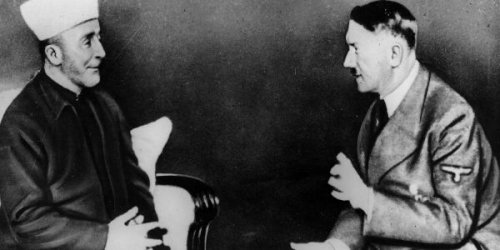Haj Amin al-Husseini led the nationalists in Palestine during the era of the Second World War. Much of what he learned, he learned from the German nationalist (Nazi) leader, Adolf Hitler. While his name is not so famous as that of Hitler or Benito Mussolini, he was in fact an amazingly influential figure in Palestine during the war. He essentially began in full the move toward nationalism which still holds weight in Palestine today. Without al-Husseini, the current war between Palestinian Muslims and Israeli Jews might be much tamer, or even non-existent.
One of his first acts of aggression toward the Hebrew community was the elimination of the sacred grounds at Hebron. His mass murder there would lead to further conflicts between the Jews and Muslims in the Middle East. Since al-Husseini would inevitably need support, he turned toward the Nazi regime and supported their cause in Europe. He collaborated with one of Hitler’s officers, and was soon proclaimed by the United Kingdom as a candidate for arrest, with a sentence of ten years pending his capture.
To evade arrest, he took refuge in Iraq where he worked more directly for the Nazi movement. He continued aiding the Nazis in the massacre of the Jews until the Allied forces began to take control over the area, upon which al-Husseini decided to aid the German cause from Germany itself. It was from Germany that he was sent to aid in the fight with the Red Army, but the tides of war would again turn after which he would need to make yet another escape to Egypt.
He would live in Egypt following the end of the Second World War, and his efforts would not be continued for some time as he continued to lay low. Eventually, al-Husseini turned over his mantel to Yasser Arafat. This would result in a continued nationalist movement; meanwhile, he went untried for his war crimes and was treated with absolute amnesty despite his part in aiding Hitler’s forces during the war, the Jewish News reports.
Haj Amin al-Husseini was incredibly involved in spreading the anti-Semitic beliefs which eventually took a foothold on many other Palestinians. While Germany eventually saw the error of extremist nationalism, Israel is steadily losing hope that Palestine will do the same. With the war in the Middle East still raging, understanding al-Husseini and his part in it does little to ease tensions. The best that can be done is to hope that no such movement gains as much ground as the one during the Second World War.
